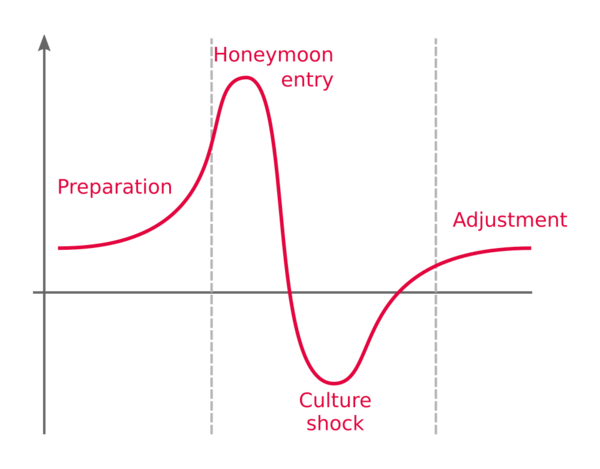3.8 Culture shock
| [checked revision] | [checked revision] |
| Line 18: | Line 18: | ||
== What can be done about the symptoms? == | == What can be done about the symptoms? == | ||
It is important that you get in touch with the topic before you go abroad. Then you will know that it will get better again after the down time. This will help you to cope with the bad times and not give up. You can also prepare individual strategies for coping and discuss them with other people, e.g. in preparatory workshops. | |||
Such strategies could look like this: | |||
* | * Do you play an instrument? Try to join an orchestra in Lübeck or the local area. | ||
* | * Do you play some kind of team sports, like handball or soccer? Maybe you can find a team in Lübeck to play with. | ||
* | * Did you always want to learn something specific, e.g. archery or 3D printing? You will certainly find a group in Lübeck that you can join, too. | ||
If you inform yourself about the opportunities beforehand on the internet, you can get in touch before your trip and arrange an appointment. | |||
So it is about being aware of potentially stressful situations, thinking about the intensity with which you might react to them, and what might help you to get through the culture shock. | |||
<loop_area type="notice">If you spend a year or longer in Germany, you should do the same again when you travel home. | |||
</loop_area> | |||
== Where can you get help? == | == Where can you get help? == | ||
Revision as of 17:49, 26 May 2021
The culture shock model (Oberg 1960) provides a theoretical basis for what people experience when they spend some time living abroad.
What are the phases and how are they characterized?
The following figure shows the different phases in a culture shock:
- Preparation,
- Honeymoon entry,
- Culture shock, and
- Adjustment.

Which symptoms can occur?
In most cases, a variety of so-called expatriate stress symptoms can occur of different types and intensities.
Of course, there are also phase-specific differences and differences in character and experience. People who have been abroad several times, e.g. those in diplomatic service, have almost no more stress symptoms after a few international assignments.
What can be done about the symptoms?
It is important that you get in touch with the topic before you go abroad. Then you will know that it will get better again after the down time. This will help you to cope with the bad times and not give up. You can also prepare individual strategies for coping and discuss them with other people, e.g. in preparatory workshops.
Such strategies could look like this:
- Do you play an instrument? Try to join an orchestra in Lübeck or the local area.
- Do you play some kind of team sports, like handball or soccer? Maybe you can find a team in Lübeck to play with.
- Did you always want to learn something specific, e.g. archery or 3D printing? You will certainly find a group in Lübeck that you can join, too.
If you inform yourself about the opportunities beforehand on the internet, you can get in touch before your trip and arrange an appointment.
So it is about being aware of potentially stressful situations, thinking about the intensity with which you might react to them, and what might help you to get through the culture shock.
If you spend a year or longer in Germany, you should do the same again when you travel home.
Where can you get help?
Who can the students turn to if they face great difficulties and are unable to get out of the crisis phase?
You are not alone IO Team, psychosoziale Beratung und psychosozialen Notdienst UKSH. die sozialen Netzwerke, die Kontakte nach zu Hause etc.